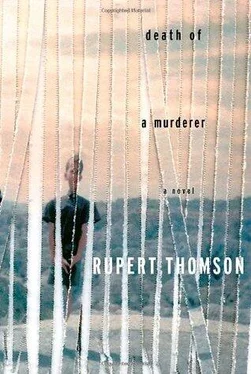He fell silent again.
“Most of all, though, I feel guilty,” he went on after a while, looking down into his empty glass. “Nothing happened to me. I got away.”
“You were lucky—”
“That’s not what I mean,” Trevor said, cutting in with a kind of savagery. “I’m linked to them for ever, those children. The ones with the names we all know. Sometimes it’s like I can sense their presence — somewhere near by…”
Billy watched as Trevor slowly lowered his face into his hands and began to cry again. There was another level to Trevor’s guilt, he realised. Not only had Trevor survived, but he had also kept the fact of his survival to himself. If he had told his parents what had happened — the woman in the white car, the man on the motorbike — if he had identified the house, it was possible that lives could have been saved. Billy rather hoped this thought hadn’t occurred to Trevor. It would be hard for him to bear.
Now Trevor had started crying, he couldn’t stop. He was hunched over, only his hands separating his forehead from his knees. Billy sat beside him on the bed and put an arm round his shoulders. Trevor’s body felt rigid, as though every muscle had been stretched to breaking-point.
Then, little by little, his breathing deepened. He had cried himself to sleep, just as a child might. Billy still had his arm round Trevor, though Trevor was leaning against him now. Trevor smelled of deodorant and alcohol. Once or twice, he jerked so violently that Billy was afraid they might both be thrown to the floor.
The next time Billy glanced at the clock on the TV, it said two twenty-five. He must have dozed off for a while. Trevor was facing away from him now, lying across the bottom of the bed, the soles of his shoes pressed against Billy’s thigh. One of his hands was curled into a fist and held close to his mouth. Billy did a quick calculation in his head. Northampton was still a good two hours’ drive away, and he was due in court at ten. He would have to be up by seven — at the latest.
He took off Trevor’s shoes and socks, then his trousers, and shifted him until he was lengthways on the bed. Trevor still hadn’t stirred. Billy couldn’t help noticing that Trevor’s legs were smooth and white, and utterly without hair. Somehow this seemed in keeping with the story he had told, the horror he had so narrowly escaped. Gently, Billy drew the covers over him.
Ssshh…fast asleep.
Although he very much doubted that Trevor would wake, he still didn’t feel he could leave. Not after what he’d heard. Switching off the lights, he loosened his tie and dropped into the chair by the window. It was a small modern armchair, with a low back, but he had slept in more uncomfortable places. Through the curtains behind him came a dim glow, citrus yellow, and Trevor’s story came with it — the bare mattress, the camera, the dirty magazines. Billy emptied his mind, then folded his hands over his stomach and shut his eyes. In the sealed hush of the hotel room, he could hear Trevor’s breathing, deep and ragged.
He woke what felt like moments later to see Trevor standing in front of the tall, thin mirror near the door. Though it was still dark, the spill of light from the bathroom allowed him to watch Trevor as he tied his tie. Trevor was wearing a suit and humming quietly to himself. He behaved as if he was on his own in the room.
Billy yawned and stretched, making more noise than was strictly necessary.
“I can’t sleep sitting up,” Trevor said. “I can never sleep on planes, for instance.”
“In my job you get used to it.” Billy yawned again. “What’s the time?”
“Nearly seven.”
Billy stood up and parted the curtains. The sky was a dull grey-blue. He could just make out a smooth grass bank and the section of main road that lay beyond. “I’m going back to my room,” he said. “I need a shower.”
“Yeah,” Trevor said, then sighed.
He seemed the less embarrassed of the two. He had humiliated himself, and that gave him a kind of edge. As for Billy, he was keenly aware of the need to be delicate. He knew too much — more, he suspected, than Trevor had intended to tell him — and he had to imagine, for the time being, that what he’d heard was just a story. Certainly he had to forget how he had held Trevor in his arms while Trevor cried himself to sleep. They were two old friends who had run into each other by chance, and they’d had too much to drink, as old friends often do. That was all there was to it. Should they ever run into each other again, there would be nothing to say. They would probably act as if they hadn’t seen each other. What had happened the night before could never be repeated, or referred to, or even remembered — not out loud, anyway.
Billy moved towards the door. One hand on the handle, he turned and looked back into the room. Trevor was opening his briefcase. Billy watched as Trevor took out a sheet of paper and frowned at it. He had the distinct impression that Trevor was only pretending to be busy, and that, as soon as he was alone, he would sit down on the bed and simply stare into space.
“Maybe see you at breakfast,” Billy said.
Trevor looked round quickly, as if he had forgotten Billy was there. “What?” he said. “Oh, sure. OK.”
But Trevor would have finished his breakfast before Billy appeared in the food barn. Trevor would make certain of that. He might even skip the meal altogether. Just get in the car and drive.
“Take care,” Billy said.
They both knew they would never see each other again.
Everything was silent in the mortuary. Billy realised that the answer-machine was no longer beeping; someone must have listened to the message while he was on his break. In the distance, on the very threshold of hearing, he thought he could detect the soothing hum of a floor-polisher — in hospitals, as in airports, cleaners nearly always worked at night — and he pictured a man with a blank look on his face guiding the machine from side to side, its brushes revolving briskly, smoothly, an endless series of tiny circles, each new circle covering a slightly different area from the last, but all the circles overlapping, and the floor becoming shinier and shinier until it existed only as a perfect reflection of what surrounded it.
Whenever Billy thought about Trevor, he was overtaken by an intense feeling of regret. He couldn’t help feeling there was more he could have done. He hadn’t asked for Trevor’s phone number, for instance, or his address — surely Trevor would’ve had business cards in that briefcase of his — nor, on returning home, had he tried to trace his old friend using the one piece of information that he’d picked up. After all, there couldn’t have been too many people called Lydgate in a small town like Stone…They had parted at the door of room number 8, and just as Billy had predicted, Trevor didn’t appear for breakfast. Their paths had crossed for the first time in thirty years, but they had chosen not to benefit from the coincidence.
Almost exactly a year later, in the autumn of 1999, a woman called Mary Betts left a message on Billy’s answer-machine at home. She had some news for him, she said. Though he didn’t recognise the name or the voice, he called her back that evening. She told him that she’d been a classmate of his at primary school. They hadn’t known each other very well, she reassured him, so he didn’t have to pretend he remembered her. He laughed.
“Before we go too far,” she said, “it’s not good news, I’m afraid. Trevor Lydgate’s dead.”
Standing in the lounge, next to the window, Billy thought of the brownish-pink grab-rails in Trevor’s hotel room. In their colour and their smoothness, in their curiously glossy quality, they had reminded him of something you might find inside a body. Organs of some kind. Intestines.
Читать дальше












